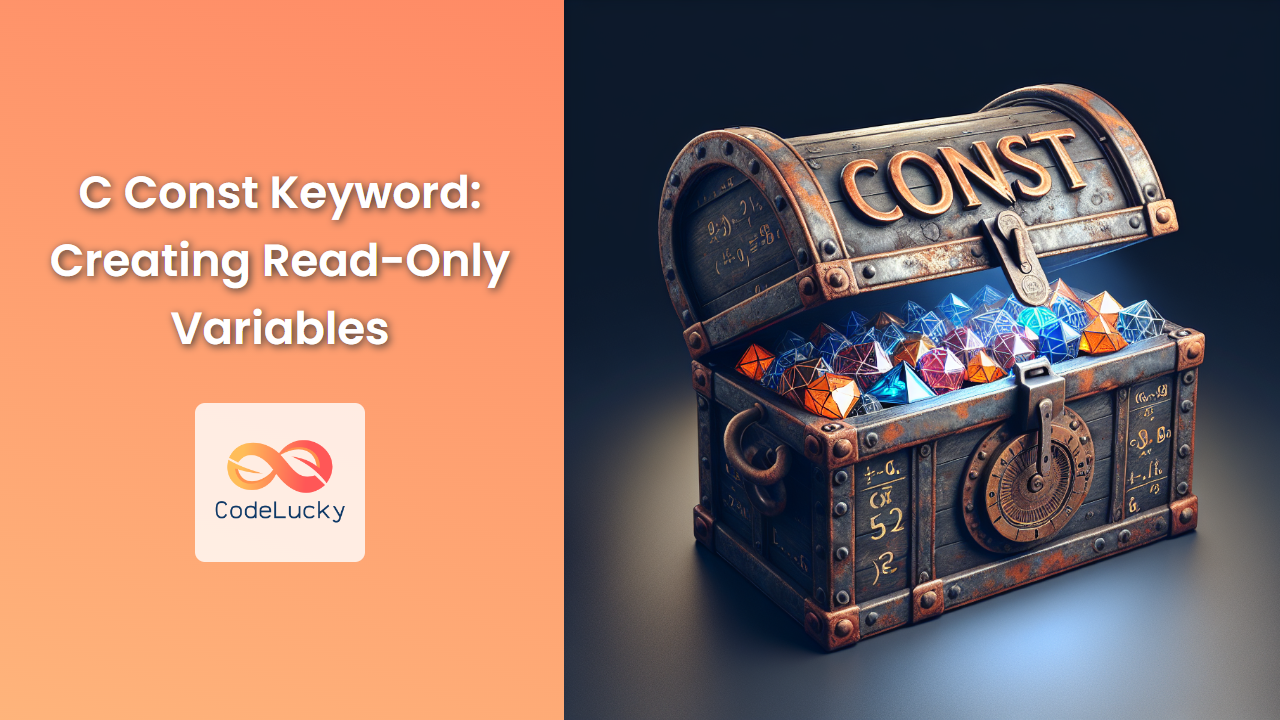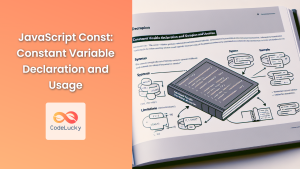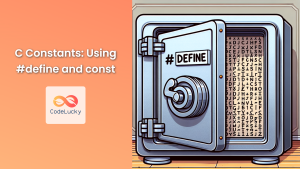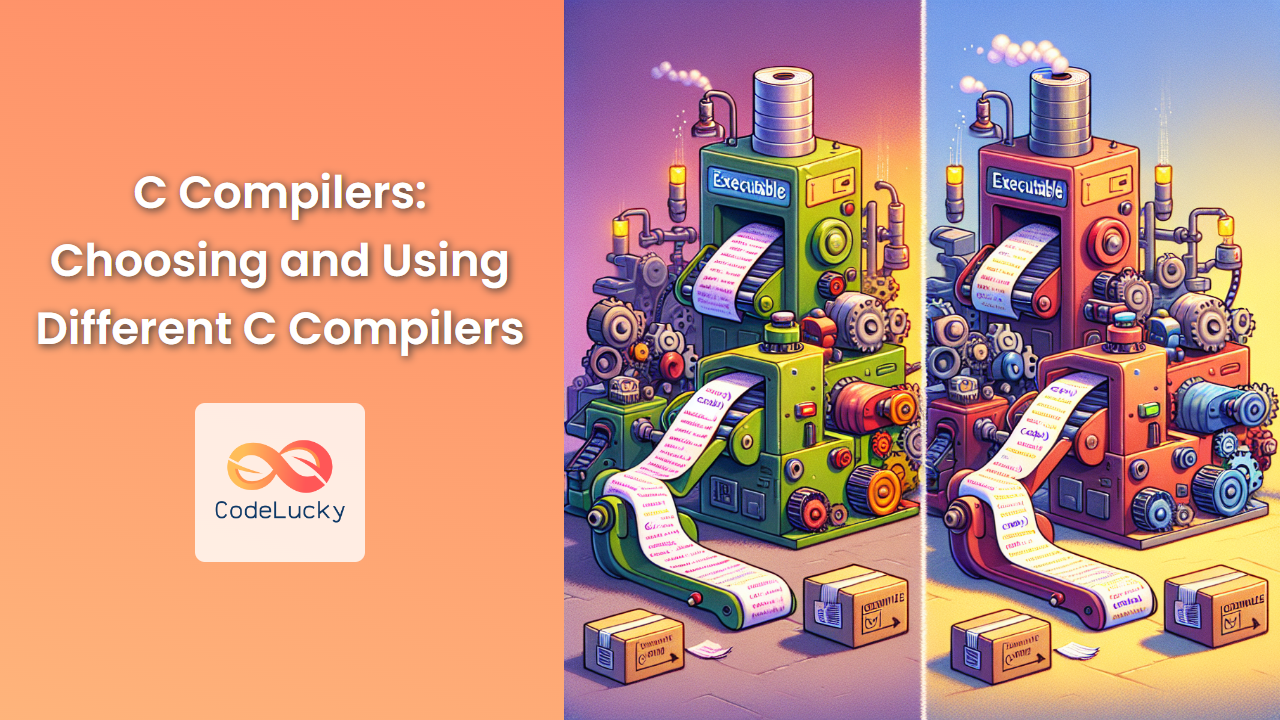In the world of C programming, the const keyword is a powerful tool that allows developers to create read-only variables. This feature is crucial for writing robust, maintainable, and secure code. In this comprehensive guide, we'll dive deep into the const keyword, exploring its various uses, benefits, and potential pitfalls.
Understanding the Const Keyword
The const keyword in C is used to declare constants or to specify that a variable's value should not be modified after initialization. When applied to a variable, it creates a read-only variable, meaning its value cannot be changed throughout the program's execution.
Let's start with a simple example:
#include <stdio.h>
int main() {
const int MAX_STUDENTS = 100;
printf("Maximum number of students: %d\n", MAX_STUDENTS);
// Attempting to modify MAX_STUDENTS will result in a compilation error
// MAX_STUDENTS = 200; // Uncommenting this line will cause an error
return 0;
}
In this example, MAX_STUDENTS is declared as a constant integer with a value of 100. Any attempt to modify this value later in the program will result in a compilation error.
🔒 Key Point: The const keyword ensures that the variable's value remains constant throughout the program's execution.
Const with Different Data Types
The const keyword can be used with various data types in C. Let's explore some examples:
Const with Integers
#include <stdio.h>
int main() {
const int DAYS_IN_WEEK = 7;
const int MONTHS_IN_YEAR = 12;
printf("There are %d days in a week and %d months in a year.\n", DAYS_IN_WEEK, MONTHS_IN_YEAR);
return 0;
}
Output:
There are 7 days in a week and 12 months in a year.
Const with Floating-Point Numbers
#include <stdio.h>
int main() {
const float PI = 3.14159;
const double AVOGADRO_CONSTANT = 6.02214076e23;
printf("PI: %.5f\n", PI);
printf("Avogadro's Constant: %.2e\n", AVOGADRO_CONSTANT);
return 0;
}
Output:
PI: 3.14159
Avogadro's Constant: 6.02e+23
Const with Characters
#include <stdio.h>
int main() {
const char GRADE_A = 'A';
const char NEWLINE = '\n';
printf("Top grade: %c%c", GRADE_A, NEWLINE);
return 0;
}
Output:
Top grade: A
🔍 Note: Using const with different data types allows you to create read-only variables for various purposes, from mathematical constants to character representations.
Const Pointers and Pointers to Const
The const keyword becomes particularly interesting when used with pointers. There are three main scenarios to consider:
- Pointer to a constant value
- Constant pointer to a value
- Constant pointer to a constant value
Let's examine each of these cases:
1. Pointer to a Constant Value
#include <stdio.h>
int main() {
int value = 10;
const int *ptr = &value;
printf("Value: %d\n", *ptr);
// *ptr = 20; // This would cause a compilation error
value = 20; // This is allowed
printf("New value: %d\n", *ptr);
return 0;
}
Output:
Value: 10
New value: 20
In this example, ptr is a pointer to a constant integer. We can't modify the value it points to through the pointer, but we can change the value of value directly.
2. Constant Pointer to a Value
#include <stdio.h>
int main() {
int value1 = 10;
int value2 = 20;
int * const ptr = &value1;
printf("Value1: %d\n", *ptr);
*ptr = 30; // This is allowed
// ptr = &value2; // This would cause a compilation error
printf("New Value1: %d\n", *ptr);
return 0;
}
Output:
Value1: 10
New Value1: 30
Here, ptr is a constant pointer to an integer. We can modify the value it points to, but we can't change the address it holds.
3. Constant Pointer to a Constant Value
#include <stdio.h>
int main() {
int value = 10;
const int * const ptr = &value;
printf("Value: %d\n", *ptr);
// *ptr = 20; // This would cause a compilation error
// ptr = &other_value; // This would also cause a compilation error
return 0;
}
Output:
Value: 10
In this case, ptr is a constant pointer to a constant integer. We can neither modify the value it points to nor change the address it holds.
🎯 Pro Tip: Understanding these different pointer scenarios is crucial for writing secure and efficient C code, especially when dealing with data that should not be modified.
Const in Function Parameters
Using const in function parameters is a common practice to indicate that the function will not modify the passed arguments. This is particularly useful when passing pointers or arrays to functions.
#include <stdio.h>
#include <string.h>
void print_string(const char *str) {
printf("%s\n", str);
// str[0] = 'A'; // This would cause a compilation error
}
int sum_array(const int arr[], int size) {
int total = 0;
for (int i = 0; i < size; i++) {
total += arr[i];
// arr[i] = 0; // This would cause a compilation error
}
return total;
}
int main() {
char message[] = "Hello, const!";
print_string(message);
int numbers[] = {1, 2, 3, 4, 5};
int result = sum_array(numbers, 5);
printf("Sum of array: %d\n", result);
return 0;
}
Output:
Hello, const!
Sum of array: 15
In this example, both print_string and sum_array functions use const parameters to ensure that the original data is not modified within the functions.
💡 Best Practice: Always use const for function parameters when you don't intend to modify the passed data. This makes your code more robust and self-documenting.
Const in Structures
The const keyword can also be used with structure members to create read-only fields within a struct.
#include <stdio.h>
#include <string.h>
struct Book {
char title[50];
const char *author;
const int year;
float price;
};
void print_book(const struct Book *book) {
printf("Title: %s\n", book->title);
printf("Author: %s\n", book->author);
printf("Year: %d\n", book->year);
printf("Price: $%.2f\n", book->price);
}
int main() {
struct Book my_book = {
.title = "The C Programming Language",
.author = "Brian Kernighan and Dennis Ritchie",
.year = 1978,
.price = 29.99
};
print_book(&my_book);
strcpy(my_book.title, "C: The Complete Reference"); // This is allowed
my_book.price = 39.99; // This is allowed
// my_book.year = 2000; // This would cause a compilation error
// my_book.author = "Herbert Schildt"; // This would cause a compilation error
printf("\nAfter modifications:\n");
print_book(&my_book);
return 0;
}
Output:
Title: The C Programming Language
Author: Brian Kernighan and Dennis Ritchie
Year: 1978
Price: $29.99
After modifications:
Title: C: The Complete Reference
Author: Brian Kernighan and Dennis Ritchie
Year: 1978
Price: $39.99
In this example, the author and year fields of the Book structure are declared as const, preventing their modification after initialization.
🔧 Technical Note: Using const with structure members allows you to create partially immutable objects, where some fields can be modified while others remain constant.
Const and Type Qualifiers
The const keyword is one of several type qualifiers in C. Others include volatile and restrict. These qualifiers can be combined to provide more specific behavior.
#include <stdio.h>
int main() {
const volatile int sensor_value = 0;
// Imagine this value is being updated by hardware
printf("Sensor value: %d\n", sensor_value);
// Even though sensor_value is const, it can change due to being volatile
// This prevents the compiler from optimizing it away
printf("Sensor value (potentially updated): %d\n", sensor_value);
return 0;
}
In this example, sensor_value is both const and volatile. This combination is often used for memory-mapped I/O where a value might change due to external factors, even though the program itself doesn't modify it.
🔬 Advanced Concept: Combining type qualifiers like const and volatile allows for fine-grained control over variable behavior, especially in systems programming and embedded development.
Const and Optimization
Using const can help the compiler optimize your code. When the compiler knows that a value won't change, it can make certain optimizations that wouldn't be possible otherwise.
#include <stdio.h>
#define ARRAY_SIZE 1000000
const int MULTIPLIER = 5;
void multiply_array(int arr[], int size) {
for (int i = 0; i < size; i++) {
arr[i] *= MULTIPLIER;
}
}
int main() {
int large_array[ARRAY_SIZE];
// Initialize array
for (int i = 0; i < ARRAY_SIZE; i++) {
large_array[i] = i;
}
multiply_array(large_array, ARRAY_SIZE);
printf("First few elements after multiplication:\n");
for (int i = 0; i < 5; i++) {
printf("%d ", large_array[i]);
}
printf("...\n");
return 0;
}
Output:
First few elements after multiplication:
0 5 10 15 20 ...
In this example, declaring MULTIPLIER as const allows the compiler to potentially optimize the multiplication operation in the multiply_array function.
🚀 Performance Tip: Using const for values that don't change can lead to more efficient code, as the compiler can make better optimization decisions.
Common Pitfalls and Best Practices
While const is a powerful tool, there are some common pitfalls to avoid:
-
Const Correctness: Ensure that you use
constconsistently throughout your codebase. This includes function parameters, return types, and variable declarations. -
Casting Away Const: Avoid casting away
constqualifiers. This can lead to undefined behavior.
const int x = 10;
int *ptr = (int *)&x; // This is dangerous and should be avoided
*ptr = 20; // This could lead to undefined behavior
-
Const and Pointers: Remember the difference between a pointer to a constant value and a constant pointer.
-
Initialization: Always initialize
constvariables when declaring them.
const int UNINIT_CONST; // This is incorrect
const int INIT_CONST = 10; // This is correct
- Const in Header Files: Use
constfor global variables in header files to prevent multiple definition errors.
🛡️ Best Practice: Embrace "const correctness" in your C programs. Use const wherever possible to make your intentions clear and to allow for better optimization and error checking.
Conclusion
The const keyword in C is a powerful tool for creating read-only variables and expressing intent in your code. By using const, you can:
- Create immutable variables
- Protect function parameters from modification
- Enable compiler optimizations
- Improve code readability and maintainability
Understanding the nuances of const, especially when used with pointers and in different contexts, is crucial for writing robust and efficient C programs. By following best practices and avoiding common pitfalls, you can leverage the full power of const to write cleaner, safer, and more optimized C code.
Remember, the judicious use of const is not just about preventing accidental modifications; it's about clearly communicating your intentions to both the compiler and other programmers who might read your code. Embrace const in your C programming journey, and watch your code become more robust and self-documenting!



















